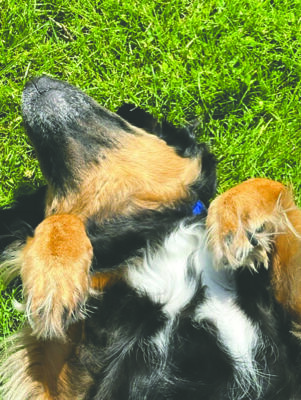While it might seem like the haze has lifted, many experts are pointing to an active, severe wildfire season this year. One of the consequences of climate change is more frequent, more intense fire events, not just in Canada, but the American west as well. With the right conditions, this could continue to affect the Long Island area throughout the summer.

Photo by Sal Massa
Poor air quality affects not only people, but also animals, including pets and livestock. According to the American Veterinary Medical Association, animals with cardiovascular or respiratory disease are especially at risk from smoke and should be closely watched during all periods of poor air quality. Look for the following signs of possible smoke or dust irritation in animals.
If any of your animals are
experiencing any of these signs, consult your veterinarian.
• Coughing or gagging
• Difficulty breathing, including open mouth breathing and increased noise when breathing
• Eye irritation and excessive watering
• Inflammation of throat or mouth
• Nasal discharge
• Asthma-like symptoms
• Increased breathing rate
• Fatigue or weakness
• Disorientation or stumbling
• Reduced appetite and/or thirst
Dog and cat breeds with a shortened muzzle, also known as brachycephaly, need extra care. Pay special attention to breathing difficulties and consult your vet if you notice any changes in your pet’s behavior.
Take steps to protect your pets; keep them indoors with the windows shut as much as possible. Birds are especially vulnerable and should be kept indoors and away from windows when air quality alerts are in place. Only allow dogs and cats outside for brief bathroom breaks. Do not exercise pets outdoors and generally avoid excessive activity until particulate matter has settled. If you must spend time outside, be sure to wipe down your pet’s fur when you come back inside, especially around the mouth and eyes, to remove smoke and ash.
For outdoor pets and livestock, avoid exercise and activity. Provide dust-free feed and wet down dusty areas like pens and holding areas. If you can, temporarily secure animals in an enclosed room with ventilation, like a utility room or garage. Allow extra recovery time, up to 6 weeks, after an extreme air quality event before resuming strenuous activity. Monitor the animal’s breathing closely to prevent further trauma.
Even inside, it is important not to contribute to poor air quality. Avoid burning candles, smoking and frying food. It is better to skip vacuuming as well, as this can recirculate pollutants. If you have an air purifier, use it, especially in the rooms where you and your pet sleep.
It is always a good idea to have a disaster plan. Include your pets in your planning, and have an evacuation kit for their needs, including medications. Know your evacuation route. If you have large animals, keep your trailer in travel condition, even if you don’t use it regularly. If you do not have a trailer, make an arrangement with someone to transport your animals if necessary.
Remember, if the air quality is poor for people, it is poor for pets, too.



















